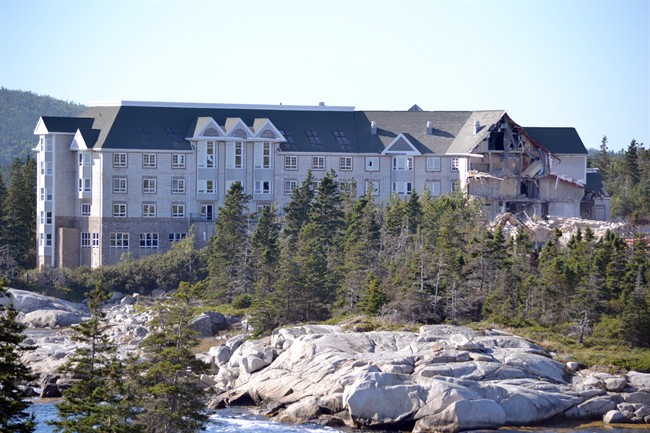It was meant to be a beacon of luxury amid the charming fishing villages that dot Nova Scotia’s pristine South Shore.

Instead, for more than 20 years, the Aspotogan Sea Spa sat abandoned atop a coastal cliff west of Halifax, its decaying hulk earning a reputation as one of the creepiest places in Canada until the unfinished resort’s last wall came crashing down last month.
Allen Webber, a veteran local municipal politician, recalls listening to the pitch for the sprawling seaside hotel from a German physician with a mix of excitement and skepticism while serving as a councillor in Chester in the early ’90s.
“At the time we thought, ‘Well, you know, it sounds a little like a crazy idea, but I mean it’s your money,”‘ says Webber, 59, now the warden for the Municipality of the District of Chester.
“It was a lot of money – it was millions of dollars. It would’ve been one of the largest projects ever to take place in this municipality.”
Construction on the 175,500-square-foot, 131-room resort started shortly after that council meeting in a rugged, remote area of the Aspotogan peninsula just down the road from Chester, an exclusive village that is home to the multimillion-dollar vacation homes of Torontonians and Americans.
The spa’s website – which remains active – paints a tantalizing, albeit dated, picture of high living with promises of beach picnics, hikes, seawater spa treatments, “intimate dips in warm tidal pools” and an “exquisite food and beverage service.”
“The Aspotogan will join a very short list of North American facilities that can claim the amenities of a world-class resort,” says the soft-spoken narrator in a promotional video that mixes imagery of fishermen hauling in their catch with a couple on a romantic sailing excursion.

Get breaking National news
Stunning Atlantic views
The five-storey, white-stone complex intended to boast sweeping views of the Atlantic Ocean from each guest room and private coastline.
While beautiful, Webber says the notion of a year-round resort accessible by a private road on the foggy peninsula didn’t make much sense to locals used to the view.
“It didn’t really seem like it fit in the location and in the context of Nova Scotia, but who were we to judge?” he says. “People in Europe think differently of us than we do ourselves, I guess. If you were a local you’d think, ‘Why would anyone want to go there?”‘
Once the building’s roof was complete, Webber recalls the investors throwing a fancy party with fine food, live music and no expense spared.
“And that was the end of it,” he says with a chuckle. “Within months it was vacant, they couldn’t find financing.”
The interior was never finished; its exposed steel and concrete a reminder of the guests who would never come and the jobs never filled.
Forgotten and left to crumble
Over time, Webber says the once buzzed-about hotel was forgotten, as were its original German investors. Local memories and media reports differ on whether it was a husband and wife or a brother and sister who came overseas.
The Huffington Post Canada included the forgotten resort in a list entitled “Abandoned Canada: 15 Places That Are Equally Creepy and Beautiful.” And in 2014, the site was used by the Red Bull energy drink company to film a skateboarding video. The 13 1/2-minute spot describes the resort as a “relic of a forgotten dream” and shows skateboarders performing tricks as sun glints through dirty windows.
Webber says the video was great publicity for the area – more than 430,000 people have watched it – but also served as the final nail in the coffin for the resort, which soon became the target of vandalism.
The ill-fated resort has since been purchased by Halifax-based development firms Southwest Properties and Armco Capital. The going price for a never-used, partially finished, deteriorating hotel? At the time, a reported $500,000.
“The intent was not to tear the spa down when we acquired it,” says Ben Young, Southwest’s vice-president of land development. “We did have some suitors along the way but just couldn’t put a deal together.”
Young says cleanup of the demolition site will continue in the spring and the area will be redeveloped as private, residential lots.
“If you’re looking for a little tranquility and a lot of property and ocean views, it’s gorgeous.”
Laurence Mawhinney, who served as the mayor of Lunenburg for 33 years, says he’s not surprised the dream of the Aspotogan Sea Spa went unfulfilled. He says a number of investigators came to the South Shore in the ’90s with big, if not unrealistic, plans.
“There was always the feeling on the part of many of us that resorts like this were ideally suited to the South Shore of Nova Scotia, but people should be extremely careful in their planning,” he says.
“I think the one at Aspotogan was just too big, too far, too fast.”
- ‘Really challenging issue’: Many B.C. communities still at high risk for flooding
- Cold warnings across the Prairies forecast wind-chill temperatures near -45 C
- Canadian military member arrested, charged in foreign interference probe
- Mailing in your taxes? CRA says changes are coming amid push to digital







Comments